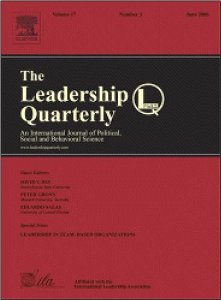Special Issue of Leadership Quarterly on Gender and Leadership
29.04.2014

Editors: Alice Eagly, Northwestern University &
Madeline Heilman, New York University
Among researchers across many academic fields, attention to the effects of gender on leadership has escalated in the past twenty years. Web of Knowledge thus reports that the topic identified by combining leader/leadership with gender yielded only 17 published articles in 1990 but 346 articles in 2012. The overriding question addressed by most authors remains why women are not better represented in leader roles. This question can be partitioned into many specific questions concerning, for example, the leadership styles and traits of female and male leaders and prejudicial reactions to female leaders. Researchers in many academic fields have contributed to these and many topics.
Consistent with Leadership Quarterly’s identity as “An International Journal of Political, Social and Behavioral Science,” the aim of the special issue is to take stock of what is known about gender and leadership across science fields. This forum is intended to give readers wide exposure to scholarship on gender and leadership. Therefore, in this special issue, we particularly welcome focused reviews of empirical research on particular topics within the broad area of gender and leadership. Sample topics include the following:
• Does stereotype threat deter women from becoming leaders?
• Are men more ambitious than women for leader roles?
• Are potential women leaders targets of prejudice and discrimination?
• Do women leaders experience backlash for their directive behaviors?
• How do gender and race interact in influencing access to leader roles and reactions to leaders?
• Do women generally follow different paths than men in attaining leader roles?
• Do female leaders have different goals than male leaders?
• What are the effects of establishing quotas for women in leadership roles?
• Do women tend to advocate for different policies than men do when holding political office?
• Have media representations of female leaders changed in recent decades?
• Under what circumstances have women emerged as heads of state?
Answering these or other questions will communicate research on gender and leadership, in its many traditions and fields of study, to a wide audience of interested readers. The deadline for submitting manuscripts though the Elsevier submission portal (http://ees.elsevier.com/leaqua/) is 31 March 2015. Submissions should have no more than 35 pages of text. Authors invited to revise their papers should expect to resubmit by 31 October 2015, with final submissions due approximately 1 December 2015. The special issue will be published in the summer of 2016.

